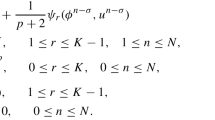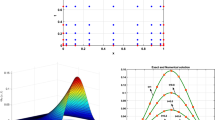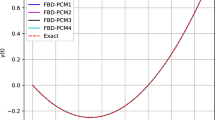Abstract
In this article, we study optimal solutions for a class of non-consistent singular linear systems of fractional nabla difference equations whose coefficients are constant matrices. We take into consideration the cases that the matrices are square with the leading coefficient singular, non-square and square with a matrix pencil which has an identically zero determinant. Then, first we study the system with given non-consistent initial conditions and provide optimal solutions. Furthermore, we consider the system with boundary conditions and provide optimal solutions for two cases, when the boundary value problem is non-consistent and when it has infinite solutions. Finally, we study the Kalman filter for singular non-homogeneous linear control systems of fractional nabla difference equations. Numerical examples are given to justify our theory.


Similar content being viewed by others
References
R.P. Agarwal, M. Benchohra, S. Hamani, A survey on existence results for boundary value problems of nonlinear fractional differential equations and inclusions. Acta Appl. Math. 109(3), 973–1033 (2010)
K. Ahrendt, L. Castle, M. Holm, K. Yochman, Laplace transforms for the nabla difference operator and a fractional variation of parameters formula. Commun. Appl. Anal. 16(3), 317 (2012)
R. Almeida, A.B. Malinowska, D.F.M. Torres, Fractional Euler Lagrange Differential Equations via Caputo Derivatives, Fractional Dynamics and Control (Springer, Berlin, 2012)
F.M. Atici, P.W. Eloe, Initial value problems in discrete fractional calculus. Proc. Am. Math. Soc. 137(3), 981–989 (2009)
F.M. Atici, P.W. Eloe, Modeling with fractional difference equations. J. Math. Anal. Appl. 369(1), 1–9 (2010)
F.M. Atici, P.W. Eloe, Linear systems of fractional nabla difference equations. Rocky Mt. J. Math. 41(2), 353–370 (2011)
D. Baleanu, O.G. Mustafa, OG, On the global existence of solutions to a class of fractional differential equations. Comput. Math. Appl. 59(5), 1835–1841 (2010)
D. Baleanu, A. Babakhani, Employing of some basic theory for class of fractional differential equations. Adv. Differ. Equ. 2011, 296353 (2011)
D. Baleanu, K. Diethelm, E. Scalas, Fractional Calculus: Models and Numerical Methods (World Scientific, Hackensack, 2012)
R.G. Brown, P.Y.C. Hwang, Introduction to Random Signals and Applied Kalman Filtering with Matlab Exercises and Solutions (Wiley, New York, 1997)
S.L. Campbell, Singular Systems of Differential Equations, vol. 1 (Pitman, San Francisco, 1980), vol. 2 (1982)
L. Dai, Singular Control Systems. Lecture Notes in Control and Information Sciences, ed. by M. Thoma, A. Wyner (1988)
I. Dassios, On non-homogeneous linear generalized linear discrete time systems. Circuits Syst. Signal Process. 31(5), 1699–1712 (2012)
I. Dassios, On robust stability of autonomous singular linear matrix difference equations. Appl. Math. Comput. 218(12), 6912–6920 (2012)
I. Dassios, G. Kalogeropoulos, On a non-homogeneous singular linear discrete time system with a singular matrix pencil. Circuits Syst. Signal Process. 32(4), 1615–1635 (2013)
I.K. Dassios, D. Baleanu, On a singular system of fractional nabla difference equations with boundary conditions. Bound. Value Probl. 2013, 148 (2013)
I. Dassios, G. Kalogeropoulos, On the relation between consistent and non consistent initial conditions of singular discrete time systems. Dyn. Contin. Discret. impuls. Syst. Ser. A 20(4a), 447–458 (2013)
I. Dassios, D. Baleanu, G. Kalogeropoulos, On non-homogeneous singular systems of fractional nabla difference equations. Appl. Math. Comput. 227, 112–131 (2014)
B. Datta, Numerical Linear Algebra and Applications (Siam, Philadelphia, 2010)
A. Dzieliski, D. Sierociuk, Stability of discrete fractional order state-space systems. J. Vib. Control 14(9–10), 1543–1556 (2008)
A. Dzieliski, D. Sierociuk, New Trends in Nanotechnology and Fractional Calculus Applications, Fractional order model of beam heating process and its experimental verification (Springer, New York, 2010)
A. Dzieliski, W. Malesza, Point to point control of fractional differential linear control systems. Adv. Differ. Equ. 13, 17 (2011)
A. Dzieliski, G. Sarwas, D. Sierociuk, Sierociuk, Comparison and validation of integer and fractional order ultracapacitor models. Adv. Differ. Equ. 11, 15 (2011)
R.F. Gantmacher, The Theory of Matrices I, II (New York, Chelsea, 1959)
W.G. Glockle, T.F. Nonnenmacher, A fractional calculus approach to self-similar protein dynamics. Biophys. J. 68(1), 46–53 (1995)
G. Golub, C.V. Loan, Matrix Computations, vol. 3 (JHU Press, London, 2012)
E. Grispos, S. Giotopoulos, G. Kalogeropoulos, On generalised linear discrete-time regular delay systems. J. Inst. Math. Comput. Sci. Math. Ser. 13(2), 179–187 (2000)
E. Grispos, G. Kalogeropoulos, I. Stratis, On generalised linear discrete-time singular delay systems. J. Math. Anal. Appl. 245(2), 430–446 (2000)
J. Hein, Z. McCarthy, N. Gaswick, B. McKain, K. Speer, Laplace transforms for the nabla difference operator. Panam. Math. J. 21(3), 79–97 (2011)
R. Hilfe, Applications of Fractional Calculus in Physics (World Scientific, River Edge, 2000), p. 463
T. Kaczorek, Photonics Applications in Astronomy, Communications, Industry, and High-Energy Physics Experiments, Positive fractional linear electrical circuits (International Society for Optics and Photonics, San Francisco, 2013)
T. Kaczorek, Singular fractional continuous-time and discrete-time linear systems. Acta Mech. Autom. 7(1), 26–33 (2013)
R.E. Kalman, A new approach to linear filtering and prediction problems. ASME J. Basic Eng. Ser. D 82, 3545 (1960)
G.I. Kalogeropoulos, Matrix pencils and linear systems, Ph.D Thesis, City University, London (1985)
G. Kalogeropoulos, I.G. Stratis, On generalized linear regular delay systems. J. Math. Anal. Appl. 237(2), 505–514 (1999)
J. Klamka, Controllability of dynamical systems. Mat. Stosow. 50(9), 57–75 (2008)
J. Klamka, J. Wyrwa, Controllability of second-order in finite-dimensional systems. Syst. Control Lett. 57(5), 386–391 (2008)
J. Klamka, Monograph New Trends in Nanotechnology and Fractional Calculus, Controllability and minimum energy control problem of fractional discrete-time systems (Springer, New York, 2010)
T.D. Lee, Can time be a discrete dynamical variable? Phys. Lett. B 122(3–4), 217–220 (1983)
A.B. Malinowska, D.F.M. Torres, Introduction to the Fractional Calculus of Variations, vol. 16 (Imperial College Press, London, 2012), p. 275
M. Mitrouli, G. Kalogeropoulos, A compound matrix algorithm for the computation of the Smith form of a polynomial matrix. Numer. Algorithms 7(2–4), 145–159 (1994)
A. Nagai, Discrete Mittag–Leffler function and its applications. Publ. Res. Inst. Math. Sci. Kyoto Univ. 1302, 120 (2003)
I. Podlubny, Fractional Differential Equations, Mathematics in Science and Engineering (Academic Press, San Diego, 1999)
A.P. Schinnar, The Leontief dynamic generalized inverse. Q. J. Econ. 92(4), 641–652 (1978)
J. Schutter, J. Geeter, T. Lefebvre, H. Bruynickx. Kalman lters: A tutorial, (1999)
D. Sierociuk, A. Dzieliski, Fractional Kalman filter algorithm for the states, parameters and order of fractional system estimation. Int. J. Appl. Math. Comput. Sci. 16(1), 129–140 (2006)
D. Sierociuk, G. Dzieliski, G. Sarwas, I. Petras, I. Podlubny, T. Skovranek, Modelling heat transfer in heterogeneous media using fractional calculus. Philos. Trans. R. Soc. Lond. Ser. A Math. Phys. Eng. Sci. 371(1990), 10 (2013)
Acknowledgments
The author would like to thank the anonymous referees for their valuable suggestions. This work was partly funded by EPSRC Grant EP/I017127/1 and by Science Foundation Ireland (award 09/SRC/E1780).
Author information
Authors and Affiliations
Corresponding author
Rights and permissions
About this article
Cite this article
Dassios, I.K. Optimal Solutions for Non-consistent Singular Linear Systems of Fractional Nabla Difference Equations. Circuits Syst Signal Process 34, 1769–1797 (2015). https://doi.org/10.1007/s00034-014-9930-2
Received:
Revised:
Accepted:
Published:
Issue Date:
DOI: https://doi.org/10.1007/s00034-014-9930-2




